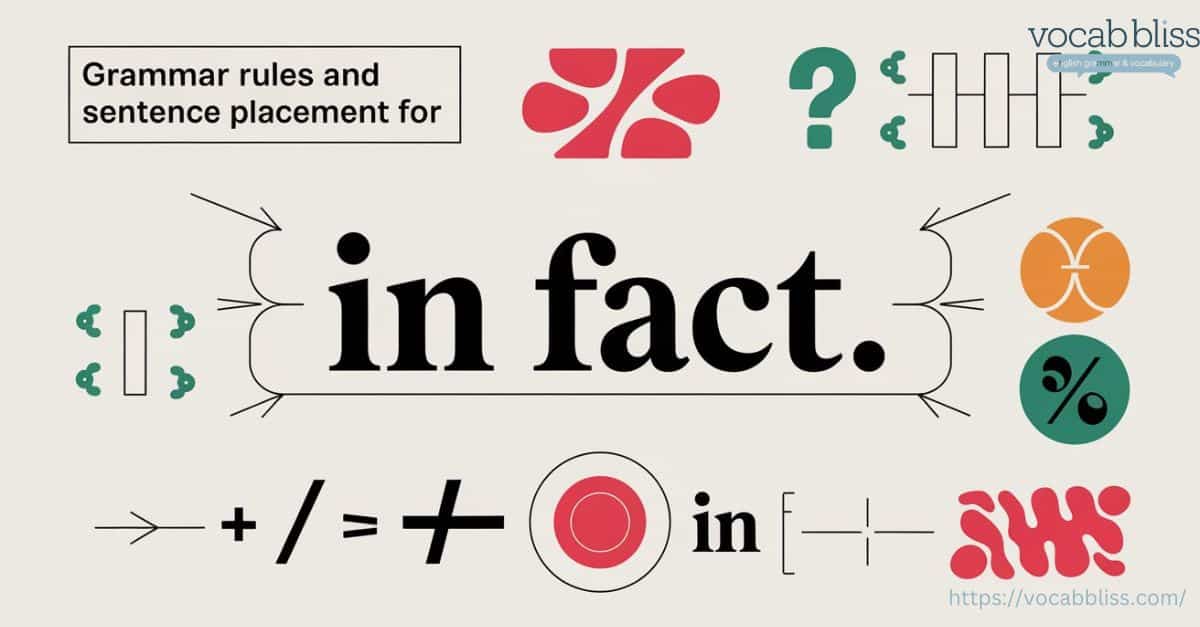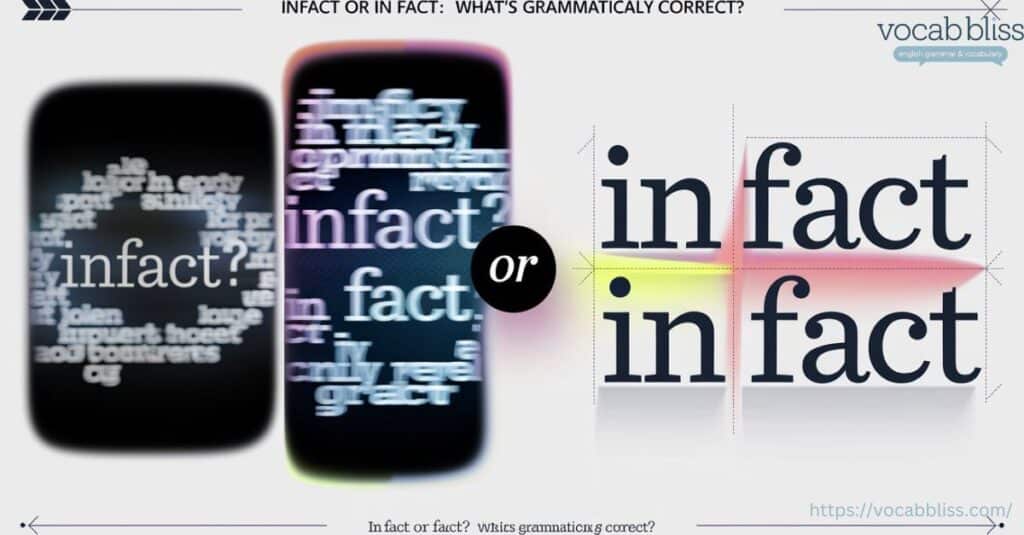The English language, though versatile and expressive, can sometimes trip us up with confusing word forms and spellings. One of these common mix-ups involves the phrase “Infact or In Fact” and its incorrect counterpart “infact.”
If you’ve ever wondered which form is correct, how to use it properly, or why this confusion even exists, you’re not alone. Let’s explore this topic in depth to clarify the spelling, grammar, and usage of these terms once and for all.
Infact or In Fact, Let’s Settle This Once and for All
Addressing the Confusion
Many people are unsure whether to use “infact or in fact”. This confusion often arises due to the similarity in spelling, but there is a crucial difference. Understanding this will help you avoid a common misspelling and improve your writing. Let’s clear up the confusion once and for all.
Explore further: ballon or balloon: Solving the Spelling Issue
Quick Answer
“Infact” is not a word. It’s simply a typographical error or a misunderstanding of how the phrase should be written. The correct form is “in fact,” written as two separate words. This phrase is used to emphasize or clarify the truth of a statement.
Here’s why:
- “In fact” combines two separate words that function together as an adverbial phrase.
- Writing “infact” as a single word is grammatically incorrect because no such term exists in standard English.
Key Tip: To avoid this error, remember that “in fact” always includes a space. If you’re unsure, try reading the sentence aloud—it should flow naturally when written correctly.
For example:
- Incorrect: She was, infact, surprised.
- Correct: She was, in fact, surprised.
What Does the Phrase In Fact Actually Mean?
Definition
The phrase “in fact” serves as a transitional expression used to emphasize or provide evidence for a statement. Its role is often to reinforce the truth or correctness of what’s being said.
For example:
- In fact, the Earth orbits the Sun, not the other way around.
In this case, “in fact” emphasizes a well-known and scientifically proven reality.
Synonyms

Here are some alternatives you can use instead of “in fact” to add variety to your writing:
- Actually
- Indeed
- As a matter of fact
- Truly
- Certainly
Examples of Correct Usage
- The book wasn’t just good; in fact, it was a bestseller.
- She seemed quiet, but in fact, she was just shy.
- He claimed he was busy, but in fact, he was watching TV.
Pro Tip: Use “in fact” sparingly to avoid overemphasis in your sentences.
The Misconception About Infact

What is “Infact”?
The term “infact” is not recognized as a legitimate word in the English language. It is a common misspelling of “in fact.” However, many mistakenly combine the two words into one, perhaps influenced by other compound words like “inside” or “inform.”
This confusion can lead to incorrect usage, especially in formal writing. While “infact” might look harmless, its use can undermine the clarity and professionalism of your work.
Featured Misspellings
- Alot (instead of “a lot”)
- Everytime (instead of “every time”)
- Infact (instead of “in fact”)
Related Misspellings
- Someday (vs. “some day”)
- Alright (vs. “all right”)
Tip: Always proofread your writing or use a reliable grammar tool to catch these errors.
Grammar Rules and Sentence Placement for In Fact

What Place Does “In Fact” Hold in Sentence Structure?
The phrase “in fact” is highly flexible and can appear in various parts of a sentence. Here are the common placements:
- At the Beginning
- Example: In fact, I had already completed the project before the deadline.
- Use this placement to introduce emphasis or contradict a prior statement.
- In the Middle
- Example: The new restaurant, in fact, has some of the best reviews in town.
- Here, “in fact” adds an interjection-like emphasis to the subject.
- At the End
- Example: They were hesitant at first but decided to join us in fact.
- Ending with “in fact” provides a conclusive emphasis.
Common Mistakes to Avoid
- Placing “in fact” too frequently in a text, which can sound repetitive.
- Using “infact” instead of “in fact.”
Pro Tip: Read your sentence out loud to ensure that “in fact” fits naturally.
Side-by-Side Comparison of Infact or In Fact
To fully understand the difference between “in fact or infact,” let’s break it down into specific aspects. The table below provides a clear and concise comparison:
| Aspect | Infact | In Fact |
|---|---|---|
| Spelling | Incorrect | Correct |
| Meaning | None (not a word) | Used to emphasize or clarify a truth |
| Usage | Never acceptable | Widely used in both formal and casual contexts |
| Examples | N/A | “She was, in fact, already aware.” |
| Grammatical Role | Not applicable | Functions as an adverbial phrase |
| Common Contexts | Misused due to typographical error or lack of knowledge | Found in writing, speeches, and conversations |
Key Takeaways:
- Always write “in fact” as two separate words.
- Avoid “infact” in any type of writing—it’s a common misspelling that undermines credibility.
- When in doubt, substitute synonyms like “indeed” or “actually” to test the sentence’s flow.
Usage Examples of in fact or infact
One of the best ways to understand the correct usage of “in fact” is to see how it appears in various contexts. From famous literary works to everyday speech, “in fact” proves its versatility as a powerful phrase that emphasizes truth and clarity.
Examples from Literature in fact or infact
- Jane Austen, Pride and Prejudice:
“He is, in fact, very well connected, and his connections are unexceptionable.”- Here, “in fact” strengthens the assertion of Mr. Darcy’s social standing.
- Oscar Wilde, The Importance of Being Earnest:
“The truth is rarely pure and never simple. In fact, it’s quite complicated.”- Wilde uses “in fact” to emphasize the complexity of truth, adding depth to his statement.
- Mark Twain, The Adventures of Huckleberry Finn:
“I didn’t want to go back no more. In fact, I’d made up my mind to leave the place for good.”- Twain uses “in fact” to underline Huck’s determination to escape.
Examples from Famous Speeches
- Martin Luther King Jr., “I Have a Dream”:
“This is not a dream; in fact, it is a vision of what should be.”- King uses “in fact” to emphasize the realism of his vision.
- John F. Kennedy, Inaugural Address:
“We do not shrink from this responsibility—in fact, we welcome it.”- The phrase highlights confidence and resolve in embracing responsibility.

from Everyday Conversations
- Reinforcing a Statement:
- “I wasn’t just impressed; in fact, I was amazed!”
- Clarifying a Point:
- “You think it’s hard? In fact, it’s easier than it looks.”
- Contradicting Assumptions:
- “She doesn’t dislike parties. In fact, she loves them!”
Versatility and Impact of “In Fact”
- In Literature: Adds weight to assertions or arguments, making them more compelling.
- In Speeches: Captures attention and underscores significant points.
- In Casual Use: Smoothly integrates into conversations to clarify or emphasize ideas.
FAQ’s About In Fact
Is “infact” ever correct?
No, “infact” is never correct in English. It’s a common misspelling of the phrase “in fact.” Always write it as two separate words.
How do you spell in fact?
The correct spelling is “in fact”, written as two separate words.
How do you spell infact?
The correct spelling is “in fact,” with a space between the two words.
How to spell infact?
You don’t—“infact” is not a valid word. Always separate the words as “in fact.”
Is infact one word?
No, “infact” is not a word in the English language. The correct form is “in fact,” written as two separate words. “In fact” is a commonly used phrase that emphasizes or clarifies a statement.
Can I use in fact in formal writing?
Yes, “in fact” is appropriate for formal contexts. Use it sparingly to emphasize a point or introduce evidence.
What are some synonyms for in fact?
You can use the following alternatives:
- Actually
- Indeed
- As a matter of fact
- Truly
- Certainly
Is in fact used in American English or British English?
“In fact” is universally used in both American and British English, making it a versatile phrase for any English dialect.
Where should “in fact” be placed in a sentence?
“In fact” can appear at the beginning, middle, or end of a sentence:
- Beginning: In fact, I didn’t know she was coming.
- Middle: The problem, in fact, was more complicated than expected.
- End: It wasn’t a coincidence in fact.
Can I overuse in fact?
Yes. While “in fact” is a powerful phrase, overusing it can make your writing sound repetitive. Opt for synonyms or rephrase sentences to maintain variety.
Conclusion: Infact or In Fact – It’s All Clear!
The confusion between “infact or in fact” is a common linguistic hiccup, but it’s easily resolved with a little knowledge. Remember: “infact” is not a word. The correct spelling is “in fact”, a powerful phrase that can emphasize, clarify, or provide evidence in your writing.
By understanding the spelling, grammar, and proper usage of “in fact,” you’ll improve your communication skills and avoid embarrassing errors. So the next time you write, take a moment to ensure that you’re using this phrase correctly—it will make your writing clearer and more professional.
Dive Deeper:
- High Quality or High-Quality: Which One Should You Use?
- Is It Fourty or Forty? Which One Is Accurate?
- Inbetween or In Between? Which Is Correct?
- Pick Up or Pickup, Pick-Up: How Should It Be Used?

Jorge Phillips is an experienced blogger who writes for Vocab Bliss, sharing his passion for the English language. With a knack for simplifying complex grammar rules and a focus on commonly confused words, Jorge helps readers navigate the nuances of English with ease. His insights aim to make learning engaging and practical.







